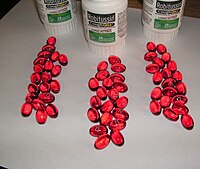
Photo from wikipedia
Patients with dysphagia may consider eating and drinking with acknowledged risk (EDAR) instead of artificial hydration/nutrition. Timely consideration of complex issues is required including dysphagia reversibility, prognosis, risk/benefit discussions, patient… Click to show full abstract
Patients with dysphagia may consider eating and drinking with acknowledged risk (EDAR) instead of artificial hydration/nutrition. Timely consideration of complex issues is required including dysphagia reversibility, prognosis, risk/benefit discussions, patient wishes, their capacity, best interests and advanced care planning. This study aimed to ascertain if EDAR protocols improve care through a systematic literature review. PUBMED, MEDLINE, CINAHL and EMBASE were searched for English language articles to May ‘19 with terms related to EDAR, dysphagia and end of life. Articles and conference abstracts with original data were agreed for inclusion by two independent reviewers. Levels of evidence were assessed using the Sackett scale (Cook et al, Chest. 1995; 4: 227–230). Study themes were identified and discussed. 12 articles met the inclusion criteria with varied methodology. The highest level of evidence was III (cohort study) and most were limited to patients with dementia, stroke, in older person’s wards or residential homes. 4 articles described a systematic approach to EDAR for in-patients and reported reductions in days nil-by-mouth until feeding plans are made and improvements in documentation of decision making, nutrition plans and capacity assessment. Other major themes included the need for an EDAR protocol, staff, patient and carer/family knowledge of EDAR, development of a protocol and the language of “risk feeding”. Formal meta-analysis was not possible due to the level and mix of methodology. There is a paucity of evidence to determine if EDAR protocols improve care. However support is emerging for a coordinated approach to managing EDAR. Findings suggest having a protocol is not enough; education, training and communication within teams and with patients and carers is essential and this justifies further work. The lack of research into the impact of EDAR protocols on patient and carer experience means they must be central to any future work.
Journal Title: Age and Ageing
Year Published: 2020
Link to full text (if available)
Share on Social Media: Sign Up to like & get
recommendations!